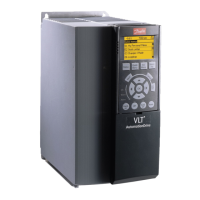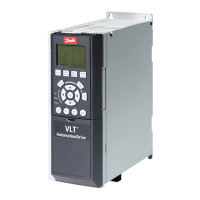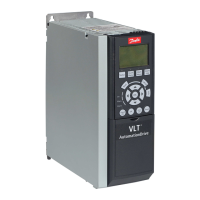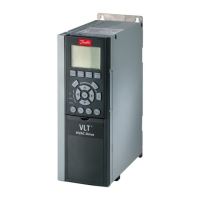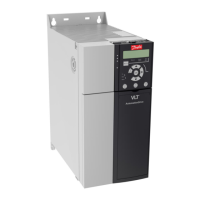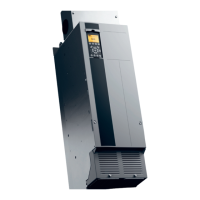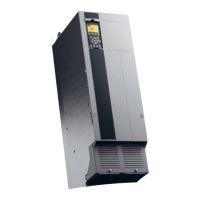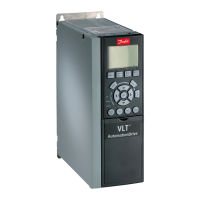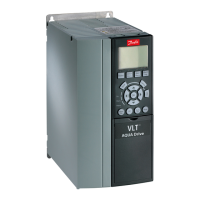3-61 Ramp 3 Ramp up Time
Range: Function:
speed mode. See ramp-down time in
3-62 Ramp 3 Ramp down Time.
3-62 Ramp 3 Ramp down Time
Range: Function:
Size
related*
[ 0.01 -
3600.00
s]
Enter the ramp-down time, i.e. the
deceleration time from the rated motor
speed n
s
to 0 RPM. Choose a ramp-down
time such that no over-voltage arises in the
inverter due to regenerative operation of
the motor, and such that the generated
current does not exceed the current limit
set in 4-18 Current Limit. The value 0.00
corresponds to 0.01 s in speed mode. See
ramp-up time in 3-61 Ramp 3 Ramp up
Time.
Par
. 3 − 62 =
t
dec
s
x
n
s
RPM
ref
RPM
3-65 Ramp 3 S-ramp Ratio at Accel. Start
Range: Function:
50 %* [ 1 - 99.
%]
Enter the proportion of the total ramp-up
time (3-61 Ramp 3 Ramp up Time) in which
the acceleration torque increases. The larger
the percentage value, the greater the jerk
compensation achieved, and thus the lower
the torque jerks in the application.
3-66 Ramp 3 S-ramp Ratio at Accel. End
Range: Function:
50 %* [ 1 - 99.
%]
Enter the proportion of the total ramp-up
time (3-61 Ramp 3 Ramp up Time) in which
the acceleration torque decreases. The larger
the percentage value, the greater the jerk
compensation achieved, and thus the lower
the torque jerks in the application.
3-67 Ramp 3 S-ramp Ratio at Decel. Start
Range: Function:
50 %* [ 1 - 99.
%]
Enter the proportion of the total ramp-down
time (3-62 Ramp 3 Ramp down Time) where
the deceleration torque increases. The larger
the percentage value, the greater the jerk
compensation achieved, and thus the lower
the torque jerks in the application.
3-68 Ramp 3 S-ramp Ratio at Decel. End
Range: Function:
50 %* [ 1 - 99.
%]
Enter the proportion of the total ramp-
downdecel time (3-62 Ramp 3 Ramp down
Time) where the deceleration torque
decreases. The larger the percentage value,
the greater the jerk compensation achieved,
3-68 Ramp 3 S-ramp Ratio at Decel. End
Range: Function:
and thus the lower the torque jerks in the
application.
3.5.6 3-7* Ramp 4
Configure ramp parameters, see 3-4*.
3-70 Ramp 4 Type
Option: Function:
Select the ramp type, depending on
requirements for acceleration and
deceleration. A linear ramp will give constant
acceleration during ramping. An S-ramp will
give non-linear acceleration, compensating
for jerk in the application
[0] * Linear
[1] S-ramp
Const Jerk
Accelerates with lowest possible jerk.
[2] S-ramp
Const Time
S-ramp based on the values set in 3-71 Ramp
4 Ramp up Time and 3-72 Ramp 4 Ramp Down
Time.
NOTE
If [1] S-ramp Const Jerk is selected and the reference during
ramping is changed the ramp time may be prolonged in
order to realize a jerk free movement which may result in
a longer start or stop time.
Additional adjustment of the S-ramp ratios or switching
initiators may be necessary.
3-71 Ramp 4 Ramp up Time
Range: Function:
Size
related*
[ 0.01 -
3600.00
s]
Enter the ramp-up time, i.e. the
acceleration time from 0 RPM to the rated
motor speed n
s
. Choose a ramp-up time
such that the output current does not
exceed the current limit in 4-18 Current
Limit during ramping. The value 0.00
corresponds to 0.01 s in speed mode. See
ramp-down time in 3-72 Ramp 4 Ramp
Down Time.
Par
. 3 − 71 =
t
acc
s
x
n
s
RPM
ref
RPM
3-72 Ramp 4 Ramp Down Time
Range: Function:
Size
related*
[ 0.01 -
3600.00
s]
Enter the ramp-down time, i.e. the
deceleration time from the rated motor
speed n
s
to 0 RPM. Choose a ramp-down
time such that no over-voltage arises in the
inverter due to regenerative operation of
the motor, and such that the generated
current does not exceed the current limit
Parameter Descriptions
VLT
®
AutomationDrive Programmming Guide
62 MG33ME02 - VLT
®
is a registered Danfoss trademark
3
3

